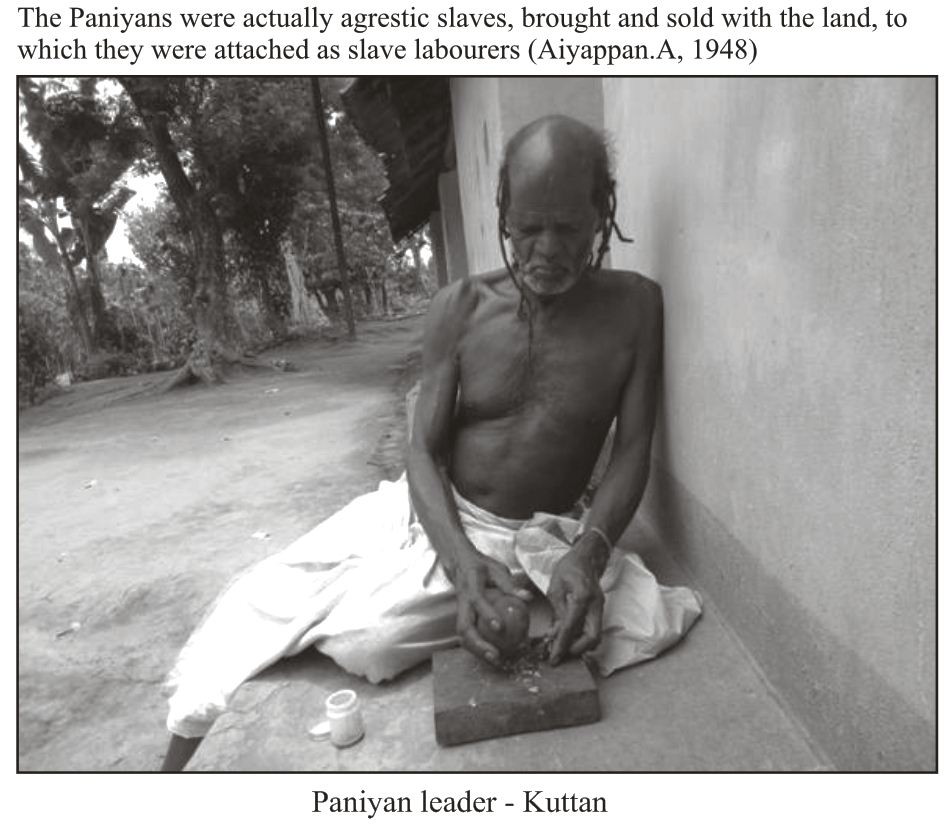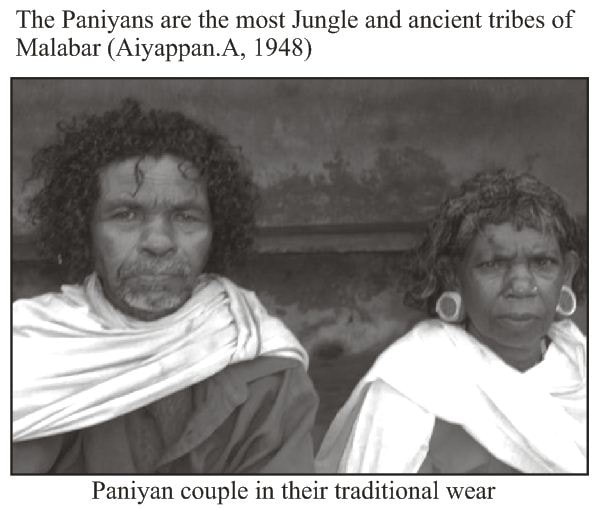|
Introduction: In s outh India, Tamil Nadu forms one of the major zones that consist of important tribal groups. According to the 2001 census, the Scheduled Tribe population in Tamil Nadu is 6.51 lakhs, consisting of 1.04 per cent of the total population. Thirtysix Scheduled Tribes have been notified in Tamil Nadu by the Scheduled Castes and Scheduled tribes order (Amendment) Act 1976 and among them, six groups namely, Paniyan, Todas, Kotas, Irulas, Kattunayakkan and Kurumbas are categorized as particularly vulnerable tribal Groups who are populated in Nilgiri District. The term ‘Paniyan’, factually means a ‘worker’, which is derived from Malayalam word Panikkar. Thus the word ‘Paniyan’ literally means ‘worker’ or ‘labourer’. The term ‘Paniyan’ is used for addressing males whereas females are referred by them as ‘Panichi. According to the census of India report, 1891 (Volume XIII, Madras), “Paniyan literally means a labourer, and the members of the Paniyan caste are agricultural labourers” Paniyans are a short, dark skinned tribe with broad noses and curly hair that they are popularly supposed to be of African descent based on their physical appearance but this is not to be established. A. Aiyappan (1948) narrates the predicament of the Paniyans as they are mostly landless labourers; illiterate, leaderless, unorganized and therefore generally unable to demand the minimum wages fixed by the Government. It is poverty and lack of self – respect that make the Paniyas willing tools in the hands of the clever crooks among the Wynaad setlers. The Paniyas, as a whole, are the poorest of the poor among other tribal communities.
The current article aims to explore the agonies of Paniyan tribe of Nilgiris in Tamilnadu. The details are provided based on the participatory observation and personal interviews conducted at five settlements namely Kottate, Kuthirampuram, Thirumangalam, PRF colony and Pigal at Pandalur Taluk of Nilgiri District, Alcoholism has become the way of life among Paniyan: They have a strong urge or compulsion to consume alcohol. Alcoholism, or more appropriately alcohol dependence, is a chronic disease that endures throughout the lifespan of paniyan. Along with the habit of alcohol, majority of them are also addicted to chewing beetle nuts. It isn’t a supplementary habit rather it goes to the extent of avoiding food three times a day and swallowing hunger by using beetle nuts. Vast majority of the Paniyan work hard as coolies in tea estates and agricultural fields, from morning till evening, earn approximately Rs.150 to 200 per day & spend most of their earnings on liquor. Paniyan deem it as prestige to greet their guests with alcohol. Even during day time - they take liquor. In a village named Kuthiravattam, almost all the males migrated to work in Mysore estates as coolies, just because of the fact that they get arrack for cheaper price of Rs. Thirtyfive, in the field that they work. They have loss of control over drinking habits. Paniyan women consume alcohol in par with their men, going to liquor shop and they never feel dishonorable to stand along with men and drink. If the liquor shop is closed for holidays these people travel to nearby State Kerala, to consume liquor. They can no longer limit their consumption or cease drinking. Interviews have revealed the fact that Paniyan are exploited by outsiders for liquor in several forms. It is shocking to observe that many of the Paniyan Women are said to be easily compromised for liquor by outsiders. An interview with an angawadi worker in the paniyan settlement exposed these disgusting facts. Paniyan women do not hesitate to take their children to liquor shop and the younger generations are thus misguided. They are not aware of the fact that if maternal alcohol consumption occurs during pregnancy, serious birth defects such as fetal alcohol syndrome may develop. Paniyan men often neglect familial responsibilities, such as caring and providing for children or spouses; they also exhibit violent or aggressive behavior, Which several times lead to quarrels, marital conflict, child or spousal abuse. They never save money and they spend it lavishly once they get it as coolie. Paniyan still lack fundamental facilities, many households are lacking basic household utensils. On the other hand, it is strange to spot out the younger generations of the same family owning mobiles in their hands. They don’t spend more to purchase household equipments rather they enjoy spending most of their income and time for ceremonies and liquor. There are no rituals for paniyan without liquor. Paniyan Children hardly attend school. Most of the Parents do not take effort to send their children to school; they are not even ready to spend money to purchase school bags and stationeries for their kids. The teachers in the elementary schools take effort to visit the settlements and bring the children to schools. At times the children hide themselves from teachers. Though they have got the provision of Tribal Residential Schools within few kilometers from the settlements, children often flee from attending schools. A village named Kottate can be stated as an example where, among the 32 households, only three families send their children regularly to school. All the other children remain in the hamlet playing in the streets. When parents were probed for reasons, for not sending the children to schools, they responded that they never force anything upon their children and it is left to the interest of the children to attend schools or not to. The children are frequently left uncared and they don’t obtain balanced nourishment. The Paniyan children are found unhygienic in the streets. The responsibilities to care for the kids are often shouldered to employees of Non Governmental Organisations and the Anganwadi workers. The children and adults suffer mostly from skin diseases and they do not avail the services of Primary Health Centre (PHC) until the illness gets severe. Interview with medical practitioner in a PHC, revealed that, Paniyan suffer from various skin diseases like Impetigo, Eczema (Psoriasis), Insect bite, Allergy, Scabies, Dermatitis. The medical practitioner added that among the Paniyan many of the adults, due to their drinking habit, suffer from Hypoglycemia, where the glucose level comes down in the blood and suffer from dehydration. They undergo giddiness, vomiting sensation, become unconscious and if left untreated this condition can be potentially life threatening. Suggestion to Government and Non Governmental Organisations working with Paniyan Establish and attach deaddiction centres along with the Primary Health Centres meant to give free treatment for the Paniyan. Appoint social workers and cousellors to work at block levels, among Paniyan to bring attitudinal change and behaviour modification. Establish free Guidance and training centres to identify school dropouts and guide, motivate, train the children and adolescents to continue education. Concluding Remarks K.N.K. Sarma (1992:364) appropriately stated that, so far the Paniyan is trying to retain their tribal character; changes are bound to persist in their traditional social organization, economic pursuit, political behaviour, etc, consequents on the changes in all spheres a human thought and activity. Despite governmental efforts for their economic uplift, these tribal groups still continue to eke out a pathetic life in the midst of ignorance, indebtedness, ill- health and above all unhealthy economic practices. There can be growth, transformation and development in the lives of Paniyan only if they are relieved from alcoholic addiction and until then their lives will be in darkness. Their life cannot be simply reformed by just providing free services and benefits. There is an immediate need to bring about attitudinal change among these people from seed level. Reference:
Ms.M. Premalatha Lecturer, Department of Social Work, Karpagam University, Coimbatore – 21, Tamil Nadu. Dr.C.R. Sathyanarayanan Director, Tribal Research Centre, M.Palada, Ooty, The Nilgiris, Tamil Nadu. |
Categories
All
Social Work Learning Academy50,000 HR PROFESSIONALS ARE CONNECTED THROUGH OUR NIRATHANKA HR GROUPS.
YOU CAN ALSO JOIN AND PARTICIPATE IN OUR GROUP DISCUSSIONS. MHR LEARNING ACADEMYGet it on Google Play store
|
SITE MAP
SiteTRAININGJOB |
HR SERVICESOTHER SERVICESnIRATHANKA CITIZENS CONNECT |
NIRATHANKAPOSHOUR OTHER WEBSITESSubscribe |
MHR LEARNING ACADEMY
50,000 HR AND SOCIAL WORK PROFESSIONALS ARE CONNECTED THROUGH OUR NIRATHANKA HR GROUPS.
YOU CAN ALSO JOIN AND PARTICIPATE IN OUR GROUP DISCUSSIONS.
YOU CAN ALSO JOIN AND PARTICIPATE IN OUR GROUP DISCUSSIONS.
|
|








 RSS Feed
RSS Feed





